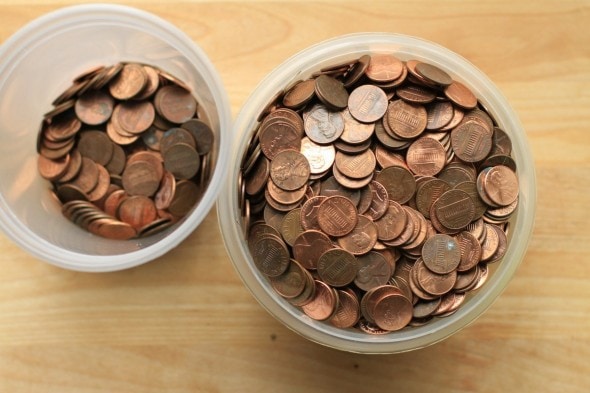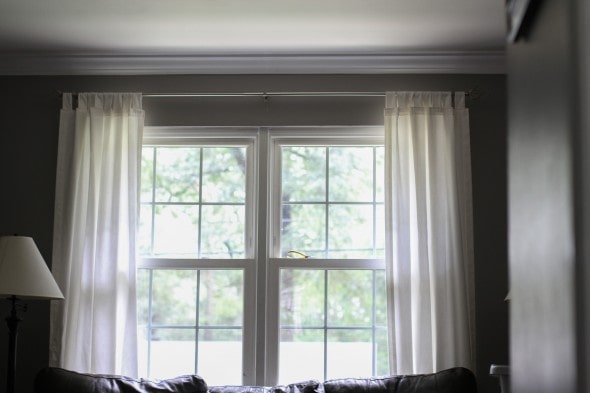The May issue of The Atlantic contained an article about middle-class Americans, and it’s getting a fair bit of notice.

These types of articles tend to be rather polarizing, with people on one side feeling like, yes, wages are unfair and it’s impossible to avoid staying out of debt because the cost of living is rising at an unprecedented pace.
And the other side tends to be all, “Dude! If you just spend your money wisely, then it’s no problem to stay out of debt/build a nest egg/retire early.”
I think the truth is probably somewhere in the murky middle.
The article does cite some alarming statistics that are raising the eyebrows of frugality enthusiasts everywhere.

For instance, a Federal Reserve study recently showed that 47% of Americans would not be able to come up with $400 to cover an emergency expense.
(They’d have to borrow money or sell something.)
And according to a 2014 Bankrate survey “only 38 percent of Americans would cover a $1,000 emergency-room visit or $500 car repair with money they’d saved.”
Frugality Does Matter
I am positive that some of these cases are due to circumstances beyond people’s control. But having spent a fair number of my adult years living on an income well below average, I can also vouch for the fact that the financial choices we make have an impact.
(To be fair, the author does state that several times.)
Except for one particularly low point in our house remodel, Mr. FG and I would always have been able to cover a $1000 emergency expense, and that was with an income that I assume was well below the average of the survey respondents.
We weren’t earning a lot of money, so we kept our spending to a pretty bare minimum. It wasn’t exactly fun, but it was more fun than being in debt. Or having no savings.

So, on the one hand, I think people have more control over their finances than they think they do. If a warehouse worker and a stay-at-home piano teacher with 4 kids can stay afloat, then at least some of those survey respondents probably can too.
But on the other hand…
Circumstances Matter Too
Mr. FG and I have made mindful choices over the years to keep our spending below our income, but there are also circumstances beyond our control that have helped us, and it would be disingenuous to ignore those.
For instance, we bought our townhouse before the housing market exploded and we ended up making $133,000 when we sold it. That allowed us to buy a single-family home when otherwise it would have been impossible.
My dad and my brother gave hours of their time to help us fix up this house, hours we’d never have been able to afford.
We don’t deserve any credit for that.
We also have been fortunate enough to avoid some financially devastating circumstances.
For instance, no one in my household has been sick enough to rack up enormous hospital bills. Mr. FG and I have never been out of work. No one here is disabled.
We sure don’t deserve credit for that.

If any of those things had happened to us while we had a really low income, we could easily have ended up in a financially disastrous state. We usually had enough saved to weather financial storms of the $3000 variety (heat pumps died at both of our houses!), but not of the $20,0000-$100,0000 variety.
Where does that leave us?
First, I’m reminded that the most important financial picture to look at is our own.
It’s easy to judge other people based on a survey response or an article, but it’s not really possible to know every in and out of their situations. And we don’t have control over how other people spend their money anyway!

So, it’s important to check our own attitudes and worry about ourselves rather than others.
And along those same lines, it’s important to acknowledge the privileges we each have, which we deserve no credit for. That goes a long way toward helping our attitude toward others be a bit more humble.
(I’m preaching to myself here because heaven knows I read that article and initially thought, “Geez! He’s been making a solid income for years and is struggling, while we managed to have a savings account even on $30,000 a year?? What in the world??” )
Second, despite the bleak things the article says about wages and income, your financial situation is probably not utterly hopeless, and you DO have some control over it.
There are lots of us out there who are carefully spending and saving our money, and we are having success at it, even in a financial climate that isn’t especially friendly to the middle class.
So, be hopeful, don’t buy into the doom and gloom and don’t fall into the, “Why even try??” trap. Your efforts to earn more and spend less will not be for naught.
Third, it’s super important to communicate with your spouse about finances.
The author admits he kept his wife in the dark for years, and I imagine things might have turned out a bit differently if she’d known their true financial state.
I use a monthly money email to keep Mr. FG in the loop and I highly recommend that practice if you have trouble with money communication!
Fourth, if you want to get into a decent financial position, you are going to need to make sacrifices.
Even if you make a good income, you can easily spend it all by living the usual American lifestyle.
If you consistently go out to eat, shop for pricey clothes, pay for expensive haircuts/hair dye/makeup/nails, always buy the latest gadget, etc., etc., etc., then you will definitely have trouble staying afloat.
And if you make large-scale financial choices such as living in an expensive house and or paying for expensive education (that’s more the style of the article author’s choices), you’ll also have a lot more trouble staying afloat.

But if you live in a modest home, consider less-expensive educational choices, eat at home, buy second-hand, repair instead of replace, do some DIY, avoid constant upgrades, and look for other ways to cut your bills (like Ting! or Ooma.), it won’t be such an uphill battle to stay financially solvent.
I mean, I think that you can live a pretty darn rich life on a small income, but doing so does take some creativity and some thinking outside of the box, and that’s what I mean when I say you need to make some sacrifices.

If you live like the average American, you shouldn’t be surprised when your finances end up like the average American’s.
But if you can manage to make some counter-cultural choices, your odds of getting into a happy financial spot are much higher.
So. Have a humble attitude toward others, and have a hopeful attitude about your own finances.
(Maybe I should have just said that and deleted the other 1100 words I wrote! ;))
_______________________

Beth
Wednesday 18th of May 2016
I appreciate a balanced approach to the article as well. " There for the grace of God go I. " Isn't that the saying? I agree there are circumstances out of our control. But there is also this ridiculous spending that happens in our culture on credit- living paycheck to paycheck because of our choices. I was horrible. I used the" I work hard, I deserve this and that and I deserve to go to out to dinner" attitude and justification.
I know for us we were normal and spent. (Ok I spent- my husband was always good with money). We just looked at car debt , school debt, house debt as normal. After all we could make the payments. Then we found Dave Ramsey and climbed our way out of debt including our home. It took 9.7 years. And only happened after I hit the wall and was in a potential bad job loss situation and realized - I had worked for 20 years with nothing to show for it but debt. ( my hubby is a stay at home dad). I prayed Lord help me find a job and I will never be in this situation again. We now teach financial peace ( Dave Ramsey's class) to give back to others tare in the situation we were in. We don't make any money teaching his class. It just keeps us honest. Glad you wrote this post. If you are Where we were - check out Dave Ramsey's principles. If you follow them it works. It's not easy. But look at what Kristen does with/for her family? And I would say they are blessed by her efforts and it can be done. Thanks for being an inspiration Kristen.
DeniG
Monday 9th of May 2016
I LOVE these sentences!
"So, it’s important to check our own attitudes and worry about ourselves rather than others. And along those same lines, it’s important to acknowledge the privileges we each have, which we deserve no credit for. That goes a long way toward helping our attitude toward others be a bit more humble."
In my experience, people (including me sometimes) forget how important those two ideas are! Thank you!
lisa
Friday 6th of May 2016
Meeghan- yes, sometimes being/doing/having enough is clearly the right path. I think that the word "enough" gives us room to breathe. By saying that we don't have to be the best or have the most, we can be content with enough. I'm good with that.
Sophie- i love that line about comparing oneself to others. Putting on a facade to seem like they have the world in their hands.....I have a relative just like that. What a shame that they feel they are nothing if they don't have the material possessions that others have.
CityMom- I don't know why my relative compares the family to others but i think you're on to something when you mention embarrassment. Maybe with the education they have and their ages, not seeming like they belong to the top 2% of high income earners may have a lot to do with it. Hhhmmmm Seems like a waste of mental energy to me.
I have had to do things very creatively in order to get what we needed. We've had major medical issues and are getting by with creativity, hard work and lots of effort. For example, to save money, I had to quit my FT job. By doing that, I don't drive as much and it saves on gas. I also have time to cook from scratch and wear simple clothes that don't require dry cleaning anymore. And honestly. it's ok. We understand our situation and are just thankful to have what we have, be able to do what we can and appreciate those people in our lives.
Andrea
Friday 6th of May 2016
Sometimes people get a wake up call on their finances. I was living the typical American lifestyle until a divorce and severe medical issues woke me up. I'm a single mom with 2 kids, massive medical debt, and a full-time job. I am the working poor. I make just enough to cover my expenses but I was gifted with growing up with grandparents that lived through the Great Depression. I was more prepared to handle the financial struggle than many people. But a lot of it is a mindset because if you really want to do something, then you will find a way to do it. It has taken me 3 years to get where I have a small amount of breathing room with each paycheck. Everyone has a different situation so they must examine all possibilities to get out of the situation.
Meeghan
Friday 6th of May 2016
I've been thinking about this a lot over the last few days. And here's where I am. We pay approximately $2000 a month in daycare for our two children. A month with five Fridays is $2500. Our mortgage is $1100 a month, so daycare is a significant portion of our take home pay - like 30%. Luckily, we can afford it, but with very little wiggle room. This makes it so hard to save money (which we try and do). But things still end up on a credit card. And I've decided not to beat myself up about this. Because being a working mom with a working dad (who is also a full time college student) with two kids under five is hard. And I'm doing the very best that I can, and that is enough. This situation won't last forever, and we've always been financially responsible before. As we remind ourselves not to judge others, we can also be kind to ourselves without letting ourselves off the hook.
Kristen
Friday 6th of May 2016
Yes. I think giving grace to ourselves goes hand in hand with giving grace to other people.